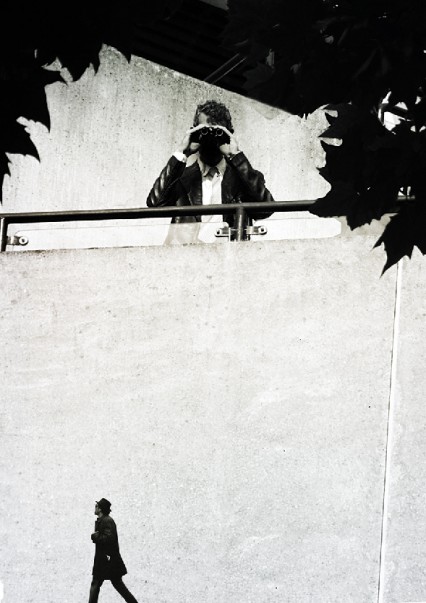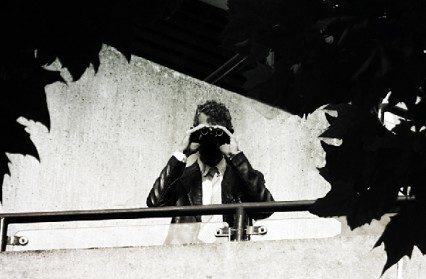Philip Morris explores a very familiar city in his review of My Life in CIA a Give It a Name production of Harry Matthews’ seemingly unreliable autobiography.
It was a strange, though not unwelcome, experience to bear witness to a romantic assignation between the elusive spy and postmodernist writer Harry Matthews and a mysterious, raven-haired, female Russian agent, on a balmy summer’s evening n the foyer of the Gare du Nord, accompanied by an a capella group singing La Vie en Rose – and all within the shadow of Cardiff’s Millennium Stadium. Even stranger were the bemused stares from assorted hen-night and stag-do ravers, upon a street-side audience – all wearing black-rimmed glasses and colour-coded badges – congregated for a performance of Swan Lake of heroic incompetence and dazzling barefaced cheek outside St Davids Shopping Centre. Such cognitive dissonance is very much the appeal of this charmingly and wilfully perverse combination of traverse theatre, which takes in Cardiff’s public spaces (doubling for Paris and Milan), various hotels and pubs, and, at one point, the back-alleys behind St Mary’s Street’s bars and restaurants.
The world evoked in Give It a Name’s ambitious treatment of Harry Matthews’ seemingly unreliable autobiography My Life in CIA, is one of ultra-

Give It a Name & Chapter
Le Monde & other venues, Cardiff
Director: James Williams
The audience gathers at the Le Monde restaurant at 7:37, before departing in four separate groups at 20:02 –
It must be said that, at times, it did appear as though the cast was having more fun than the audience, and their improvisations bordered on the shambolic at times, but the overall sense of chaotic displacement, bemused alienation and affectionate parody that they created was a considerable collective achievement. Standout performances come from Dean Rehman, as Patrick Burton-
My Life in CIA not only overlays the Paris and Milan of Matthews’ imagination across the physical geography of Cardiff, it also breaks up the text of his autobiography into a series of fragmentary, though interlinked, episodes that are distributed across its multiple locations. As such, it is difficult to trace any narrative, or construe any discernible meaning for it all without a detailed familiarity with the source material. That said, the principal pleasure of My Life in CIA were those moments when the familiar cityscape of Cardiff was transformed through the multi-
The evening is not without its difficulties, a needless ten-
With its postmodern games of form and storytelling My Life in CIA belongs to a post-
You might also like…
Emily Vanderploeg was at the Taliesin in Swansea to catch Theatre Témoin’s FEED, a vicious and uproarious takedown of our modern addiction to mobile phones.
Philip Morris is a regular contributor to Wales Arts Review.











